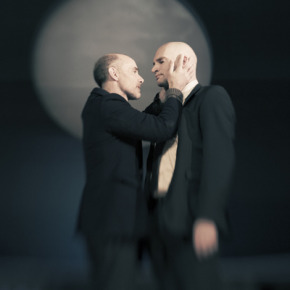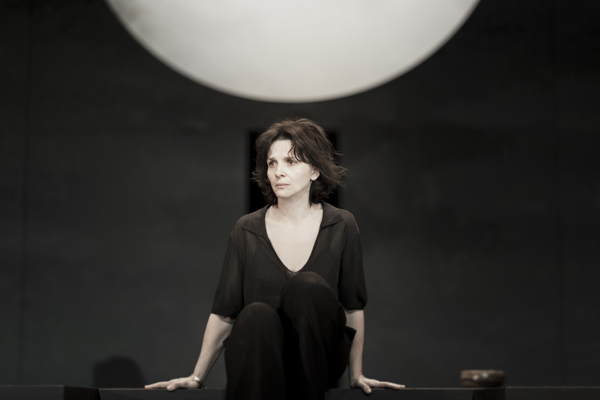The world’s pendulum is Antigone’s heart
by Mika Provata-CarloneIvo van Hove’s production of Antigone at the Barbican reminds us of what theatre is all about. Why tragedy and the Greeks are still crucial to our understanding of our humanity and inhumanity, why they still present us with a timeless meaning, an ethics of eternity. Ivo van Hove has given us a haunting, eerie production, grey, austere and stark, as well as flooded by blinding light. The translation by Anne Carson is strong, beautiful, reverberating with Sophocles’ text. Every word is significant, well-chosen, balanced with cutting precision as well as pulsating with modernity, like the line “a sort of sacred technicality” that Creon spits out to explain his stratagem to starve Antigone to death without formally committing a miasma, a moral and legal transgression. The set by Jan Versweyweld is full of references, pregnant with all that has come before it, and yet stripped of anything redundant or cumbersome. In the richness of its abstraction, it is like new writing on a wise-old palimpsest.
The beauty of Greek drama is precisely this, its immaculate, weightless simplicity. The challenge is to know all that makes that bare minimalism such an enduringly powerful means of communication, all the mythic strands and allusions, each of which serves a crucial, inalienable purpose. The Greek audiences breathed, lived these myths as an organic language, they had a personal, thriving relationship with what are echoes for us at best. Edith Hall’s essay and Ivo van Hove’s introduction in the programme are effective, poignant pieces of both guidance and reflection.
The Greeks would have known of the story of the son of King Laius and Queen Jocasta, who was exposed to die on a mountain because the Delphic oracle predicted he would kill his father; who is saved by the shepherd Phorbas and adopted by King Polybus of Corinth. The prince with the swollen feet, Oedipus, grows up and flees his adoptive court because another Delphic oracle warns him he will kill his father – which he does, unbeknownst to him, on his way away from Corinth, at a point where three roads meet. They would also know about the man Oedipus who answered the riddle of the monstrous Sphynx, and cast her in the abyss: What walks on four legs at dawn, two legs at midday and three legs at nightfall? Man! Oedipus had proclaimed, and the Greeks knew that he was wrong as much as he was right.
They would have known the rest of the story too, how he married his mother and begot his own brothers and sisters in his children. How he ruled wisely, until he was blinded by his own blazing-bright reason: the machine-gun volley of t-t-ts of the sightless all-seeing Tiresias from Sophocles’ Oedipus Rex would certainly ring maddeningly in their ears: “τυφλὸς τά τ᾽ ὦτα τόν τε νοῦν τά τ᾽ ὄμματ᾽ εἶ” – “you blind man, your mind is murky your ears are deaf your eyes are blind…” They would have wept for Jocasta who hung herself, for Oedipus who gouged out his own eyes, they would have followed this now wreck of a man and his two daughters to Athens, where Theseus alone would welcome him. They would have shivered at the arrival of Polynices, his son, and Creon, the emissary of Polynices’ brother, Eteocles, and brother to Jocasta: they have each come to abduct the cast-off Oedipus because that Delphic oracle has once more issued a prediction: the city that possesses Oedipus’ bones will be unassailable. Oedipus curses both brothers, and proclaims their sisters to be the true men among his children. He then disappears, drawn to eternity by Apollo, “a wondrous death if ever mortal’s was.” No one will possess his bones.
A Greek audience would have glimpsed Agamemnon in Creon, as they would glimpse Electra in Antigone… It is the dead that share the realm of Thebes.”
After Oedipus was exiled from Thebes, his two sons were set to rule in alternate years: Eteocles, whose name means true glory and Polynices whose name is full of strife. Eteocles refuses to surrender the throne to Polynices after his year is over, so Polynices flees to Argos, where he will raise an army of seven heroes to fight, at the seven gates of Thebes, that city’s seven worthiest men, Eteocles among them. Tiresias foretold Thebes would stand only if Creon’s son Menoecceus was sacrificed to Ares, and so brave Menoecceus kills himself as sacrifice; a Greek audience would have glimpsed Agamemnon in Creon, as they would glimpse Electra in Antigone. Euripides gives the end of that clash in Phoenician Women: “So side by side the brothers fell to earth/one by the other; thus they shared the realm.” It is the dead that share the realm of Thebes.

Finbar Lynch (Tiresias) and Patrick O’Kane (Creon/Kreon) in Ivo van Hove’s Antigone at the Barbican © Jan Versweyveld
Creon will ascend to the throne, coming on Sophocles’ stage as the sun after real and existential darkness. Both the regal and the sinister combine in the first words uttered by the chorus, ingeniously absorbed in Ivo van Hove’s production by five of the eight members of the cast: the sun is the golden dawn of Theban future, the beginning of a time without Oedipus’ miasma, but also inseparable from the speeding ray of the Argive force that caused such devastation and bloodshed. It is the blazing light of Zeus striking down the Argive host as well as the light of pure reason blinding both Creon and Oedipus. A giant circle dominates the set by Jan Versweyweld: diurnal, ominous, that Sophoclean sun that makes things visible as well as blinding vision. The circle is an ineluctable, remorseless pendulum of time and fate, an immense aperture into the tiny fragment of the cosmos that is humanity.
This bright circle of the sun is central to Sophocles, where it is saviour and sole redeemer, but also a scorching power meting out death. The idea of a pendulum marking out time, pacing life and immortality, sounding the rhythm of impending crisis and death, evinces stirring echoes from Marguerite Yourcenar’s Antigone or Choice: “Haemon hanging from the neck of the immense suicide, dragged by the oscillation of this pendulum which seems to be measuring the range of death. Joined to one another as though to weigh more, their to-and-fro sinks them each time deeper in the grave, and this throbbing weight resets in motion the mechanism of the stars. The giveaway noise crosses the cobbled streets, the marble tiles, the walls of hardened clay, fills the dry air with an arterial pulse. The soothsayers put their ears on the ground, listen like doctors, to the chest of the earth that has fallen in a state of lethargy. Time resumes its course to the beat of God’s clock. The world’s pendulum is Antigone’s heart.”
Antigone is not a play about living men and women, but a play of ghosts, a play at the end of time and of existence.”
As Antigone’s heart stops, so does the heart and the story of Thebes. In fact, Antigone is not a play about living men and women, but a play of ghosts, a play at the end of time and of existence, if existence is kept within the boundaries and scope of Oedipus’ and Creon’s understanding of its value. This ghostliness, this lingering yet departing humanity, is powerfully captured in Ivo van Hove’s production, which stresses the fatality of the story of Oedipus and of Antigone through a background of blurry film footage of shadowy figures and landscapes blended with home movies of children playing. Unlike the cycle of the Oresteia, their story contains no ending of the chain of hubris and blood-shedding, of the tug between human and divine justice. Why? Because of Oedipus’ answer to the Sphynx.
The riddle of the Sphynx is about the inherently riddling, enigmatic nature of man. The Sphynx herself is the inscrutability of being and nothingness, she is mystery, both horrifying and awe-inspiring, and this is why Oedipus is wrong. Instead of answering “Man”, one ought to answer the question with another: “what or who is man?” This too leads to a higher mystery, since man cannot answer absolutely: man is not god. Both Oedipus and Creon think that their reason, their power to think logically and to investigate critically equates them to gods – replaces gods, in fact. Like Goya, Sophocles urges us to see that “the dream of reason produces monsters”, as does the bureaucratic resuming of business at the end of Ivo van Hove’s production.
Antigone is often accused of being equally ‘monstrous’, unbalanced in her engagement with the human and the divine; of focusing too much on the personal and ignoring the requirements and exigencies of the state, of practical, applied society. Yet in her speech with which she bids farewell to this world and to life, her first words are addressed to the citizens of her homeland. She does not address family or friends and that is significant; her own social and political conscience is richer than Creon’s, it contains, presupposes and salvages humanity. Sophocles stresses the tragic irony through the double entendre of arche vs. anarchy in the play. Authority of leadership and total power are not the same. Creon thinks himself king, but the play makes clear what the audience fully knows: Thebes not only has an ‘anarchist’ in Antigone, it has above all an anarchon, a leaderless, empty throne since the death of Oedipus. Ivo van Hove gives us a further nuance: a Creon surrounded by family, effusive and emotionally responsive in his private moments, even to Antigone after she has been arrested. This makes our shock at his ‘totalitarianism’, his brutal and frozen public persona all that much harrowing and effective.
The eternal power of Greek plays is that their vital revelations far transcend the sum total of their parts. What Aristotle called Methexis and Recognition, the affinity with our fellow men and the acknowledgement of truths of sacred magnitude are achieved because of the plays’ profound humanity, their elemental spirituality, the simple faith that meaning, life, community are possible, and that they are necessary. Any production of a Greek play that has failed to reach us has failed because it lacked that faith, assuming rather a false existential, philosophical, experiential or historical alienation. The Barbican production of Sophocles’ Antigone succeeds because it believes consciously in meanings that transcend temporality. It also succeeds because it retrieves the Aristotelian credo that tragedies are there to teach our souls to be, our minds to think and our hearts to feel, both compassion and endurance. So are there no flaws in Ivo van Hove’s adaptation? There are a few, which is why tragedies were taught and re-taught. Yet his teaching does have the perfection of its completeness, of the fullness of its statement and purpose of being.
Antigone completes its run at the Barbican on Saturday 28 March. Read more.
Mika Provata-Carlone is an independent scholar, translator, editor and illustrator, and a contributing editor to Bookanista. She has a doctorate from Princeton University and lives and works in London.


